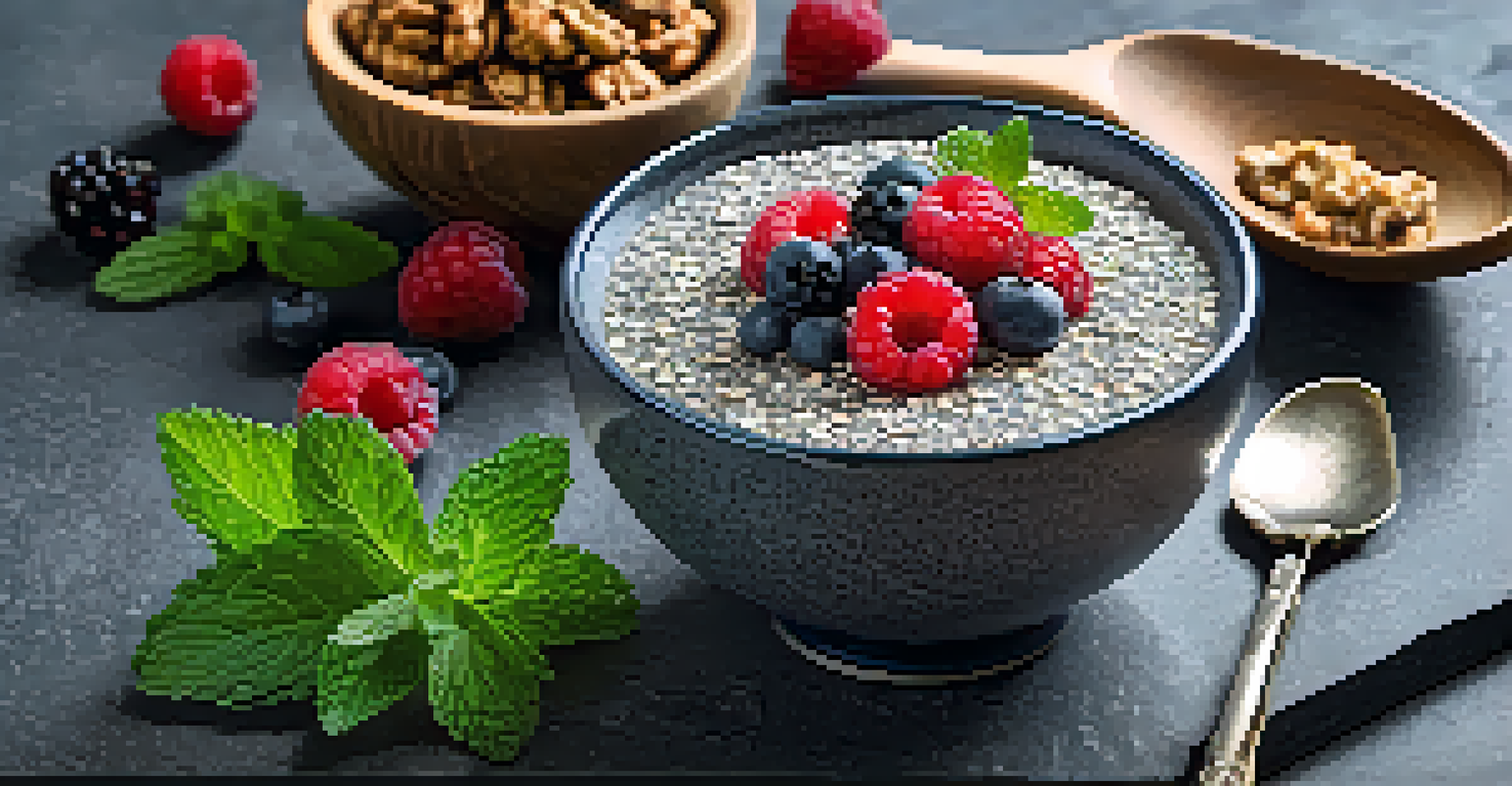The Role of Omega-3 Fatty Acids in Muscle Health

What Are Omega-3 Fatty Acids and Their Sources?
Omega-3 fatty acids are essential fats that your body cannot produce on its own. They play a crucial role in various bodily functions, especially in muscle health. Common sources include fatty fish like salmon, walnuts, flaxseeds, and chia seeds, making it easy to incorporate them into your diet.
Omega-3 fatty acids are crucial for health and well-being, supporting everything from muscle recovery to brain function.
These fats are categorized into three main types: ALA (alpha-linolenic acid), EPA (eicosapentaenoic acid), and DHA (docosahexaenoic acid). ALA is primarily found in plant sources, whereas EPA and DHA are abundant in fish. Knowing these sources can help you make informed dietary choices for optimal muscle support.
Incorporating omega-3s into your diet not only fuels your muscles but also enhances overall health. By consuming a variety of these omega-3-rich foods, you can ensure your body receives the necessary nutrients to thrive.
How Omega-3s Support Muscle Recovery
After intense workouts, your muscles need time to recover, and omega-3 fatty acids can significantly aid this process. Research suggests that omega-3s help reduce inflammation, which is vital for muscle repair. Less inflammation means faster recovery times, allowing you to get back to your workout routine sooner.

In addition to reducing inflammation, omega-3s have also been linked to improved muscle protein synthesis. This process is essential for building new muscle fibers, contributing to stronger muscles over time. Consider omega-3s as your recovery ally, helping to rebuild what your workout has broken down.
Boost Recovery with Omega-3s
Omega-3 fatty acids help reduce inflammation and promote faster muscle recovery after workouts.
Integrating omega-3s into your post-workout nutrition can enhance recovery. Think of a delicious salmon salad or a smoothie with flaxseed—both tasty ways to provide your muscles with the support they need after a strenuous session.
The Impact of Omega-3s on Muscle Strength
Beyond recovery, omega-3 fatty acids can also play a role in building muscle strength. Studies indicate that individuals who consume higher amounts of omega-3s tend to experience greater muscle strength gains. This is particularly important for athletes and those engaging in strength training.
The power of omega-3s is not just in their ability to reduce inflammation, but also in their ability to enhance recovery and performance.
The mechanism behind this involves omega-3s' ability to enhance muscle cell membranes, allowing for better nutrient absorption. When your muscle cells can effectively utilize nutrients, you're more likely to see improvements in strength and performance.
Incorporating omega-3-rich foods or supplements into your diet can thus be a game-changer for your strength training goals. It's not just about lifting weights; it's about giving your body the right fuel to maximize its potential.
Omega-3s and Aging Muscles: A Protective Shield
As we age, maintaining muscle mass becomes increasingly challenging. Omega-3 fatty acids can be your secret weapon against age-related muscle loss, known as sarcopenia. Research shows that omega-3s may help slow down this decline, promoting better muscle health in older adults.
These fatty acids work by enhancing protein synthesis and reducing inflammation, both of which are crucial for preserving muscle mass over time. By incorporating omega-3s into your diet, you can potentially safeguard your muscles against the natural effects of aging.
Strengthen Muscles with Omega-3s
Regular consumption of omega-3s can enhance muscle strength and improve performance by optimizing nutrient absorption.
A diet rich in omega-3s, combined with regular exercise, can lead to a healthier, more active lifestyle as you age. Think of it as a way to maintain your vitality and strength, allowing you to enjoy life fully.
Potential Sources of Omega-3s in Your Diet
If you're looking to boost your omega-3 intake, several delicious food sources are available. Fatty fish like salmon, mackerel, and sardines are top contenders, packed with EPA and DHA. If you're not a fan of fish, don't worry—plant-based sources such as chia seeds, hemp seeds, and walnuts are excellent alternatives.
Adding these foods to your meals can be both easy and enjoyable. For example, tossing walnuts into your morning oatmeal or blending chia seeds into a smoothie can provide you with a tasty omega-3 boost. Plus, there are plenty of omega-3 supplements available if you're unable to get enough through food alone.
By diversifying your sources of omega-3s, you not only enhance flavor in your meals but also ensure your body receives a well-rounded supply of essential nutrients for muscle health.
Recommended Daily Intake of Omega-3s
Determining the right amount of omega-3 fatty acids for muscle health can depend on various factors, including age, activity level, and overall health. The general recommendation is to aim for at least 250-500 mg of combined EPA and DHA each day. This can typically be achieved through two servings of fatty fish per week.
For those who are vegetarian or vegan, focusing on ALA sources is essential, with a target of around 1.1 to 1.6 grams per day. This can be achieved through the consumption of flaxseeds, chia seeds, and walnuts, among other plant-based options.
Combat Aging with Omega-3s
Incorporating omega-3 fatty acids into your diet can help preserve muscle mass and combat age-related muscle loss.
Monitoring your omega-3 intake can help you stay on track with your muscle health goals. Consider keeping a food diary, or simply pay attention to how you feel after meals rich in omega-3s—it’s a great way to gauge their impact on your overall performance.
Conclusion: Embrace Omega-3s for Optimal Muscle Health
In summary, omega-3 fatty acids play a vital role in muscle health, from supporting recovery to enhancing strength and protecting against age-related decline. By understanding their benefits, you can make informed dietary choices that support your fitness journey.
Integrating omega-3-rich foods into your diet is not only beneficial for your muscles but also for your overall health. The journey of healthy eating can be enjoyable when you explore various flavors and textures to keep things interesting.

So, whether you're a seasoned athlete or just starting your wellness journey, embracing omega-3s can provide the extra support your muscles need. It's time to make these essential fats a part of your daily routine and reap the benefits they offer.